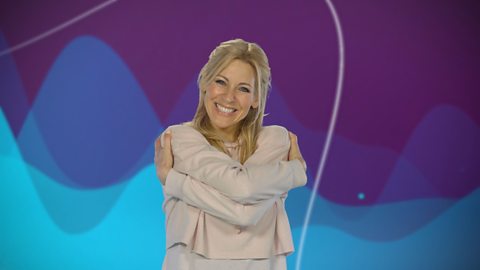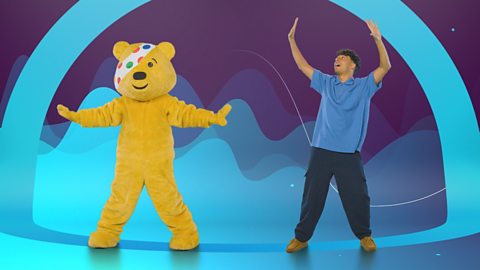Rhys Stephenson:
OK, Super Movers
It's time to learn about our rights
And how to show some respect
Let's do it
♫ I respect you and you respect me
Being respectful is the way to be
I've got rights
And so have you
Being respectful is the thing to do
I respect you and you respect me
Living your life respectfully
I've got rights and so have you
Being respectful is the thing to do
The right to a childhood
To keep us healthy
The right tobe heard or be treated fairly
A right to education
A school to you name
The right to be different orbe treated the same
Self respect! A thing to do
As with everyone else and peopledifferent from you
Respecting each other andrespecting our rights
Showing respect we can do this right
I respect you and you respect me
Being respectful is the way to be
I've got rights
And so have you
Being respectful is the thing to do
I respect you and you respect me
Living your life respectfully
I've got rights and so have you
Being respectful is the thing to do
How do you like to be treated?
Politely. Me too, we too
It's the way to be
How we show respect
It's up to us
But doing it politely is a real must
We could disagree and start arguing, but wecan solve this together by listening
Taking turns and showing respect
Seeing their point ofview with resolving effects
(Oh) take on board another view
(Oh) to show respect is the thing to do
(Oh) open your mind to diversity
(Oh) that's R.E.S.P.E.C.T.
Different birthplacesand favourite teams
Different backgrounds from different scenes
Sometimes we are different, sometimeswe are the same
Different viewpoints and differentlast names
Talking it through
We won't always agree, but wediffer in opinion respectfully
Respecting each other and respecting our rights
The right to respect
We have seen the light
I respect you and you respect me
Being respectful is the way to be
I've got rights and so have you
Being respectful is the thing to do
I respect you and you respect me
Living your life respectfully
I've got rights and so have you
Being respectful is the thing to do ♫
Rhys Stephenson performs this stirring Super Mood Movers song about respecting ourselves and others.
After viewing, singing and dancing along, your class could try some of these activities to further explore their learning:
Activities
- Classroom rules: Ask - 'What rules do you think people should have in a school?' List the pupils' responses in two columns: 'don'ts' such as 'don't call people names' and 'do's' such as 'be polite'. Encourage the children to suggest positive rules for all the terms in the 'don'ts' column, e.g. 'walk in the corridors' instead of 'don't run in the corridors'.
- Classroom contract: Ask - 'What are the most important rules on our list?' Children could discuss them and take a vote. Ask: 'Would it be OK for me to expect you to follow these rules, but not follow them myself?' Again the class could discuss and vote. The class could write up the set of positive rules they have developed for a wall display. Everyone in the class (including teachers and helpers) could sign it as a pledge to take responsibility and respect the rights of others.
- Role-play: give and take: Ask pupils to work in pairs to show what can go wrong if people don't respect the feelings of others. You could ask children to mime a situation where co-operation is needed: for example, sharing a reading book, throwing and catching a ball, sharing out a bag of sweets, building a model or trying to get through a narrow doorway from opposite directions. Pupils could illustrate what can go wrong when people are unco-operative or selfish… And then replay the mime to show how a co-operative couple could accomplish the task by being considerate. Establish that respect is mutual and needs give and take.
- Respect and how to show it: Ask - 'How can we show other people respect?' Gather pupils' suggestions such as: listen to other people and give them a chance to talk; remember to say please and thank-you; take turns fairly; don't leave other people out or judge them harshly because they are different from you. Establish that respecting the views of other people doesn't mean you always have to agree with them: you can politely and respectfully disagree. Ask: 'What is fair treatment?' Guide the discussion to a definition such as: 'Fair treatment is the treatment we would want to receive from other people. We should treat others the way we would like to be treated.'
- Responsibility: Begin with: 'When we act responsibly, we look after people or things. If we have a responsibility to someone else, we look after them and try to make sure their needs are met or that they are treated fairly.' Ask: 'Who is responsible for you? How do they show it?' Gather the pupils' stories and responses. Then ask: 'Who or what are you responsible for? How do you show it?' Again, gather the children's responses.
- Rights: Begin with: 'I believe you have a right to be treated fairly. You have a right to be cared-for. You have a right to an education . . . What do you think that word right means here?' Gather the children's responses and guide them to a definition similar to; 'a right is something important in life that we should all equally expect to have'.
- What rights do we have?: Ask - 'What rights do you think you should have?' Children could work in pairs to list these rights. They could share their ideas with the class. As they do this, ask: 'Is there a difference between things we would like to have and things we should have a right to have?' And: 'Are the rights we should have actual physical things, or are they ideas and freedoms?' Establish that rights are a share understanding of the things all people need to live well, to be respected and to respect others.
- UN Convention on the Rights of the Child: Ask pupils to search online for posters that illustrate the search term 'UN Rights of the Child'. Explain the United Nations (a group of nearly 200 countries including the UK) has agreed all children should have these rights. Pupils could make their own posters to illustrate the UN Convention. Ask: 'Should we all have a right to a childhood?' Gather the pupils' responses.
- Rights and responsibilities: Ask - 'Can you have a right without any responsibility? What happens if you have the right to say what you think, but you don't have a responsibility to listen to what anyone else says?' Establish that each of our rights is balanced by a responsibility to respect the rights of others. Pupils could write a set of sentences using the format: 'I have a right to… and I have a responsibility to…' For instance, they might write: 'I have a right to be heard and I have a responsibility to listen to others.'
- What these words mean to me: Write these words on the blackboard or whiteboard: respect, self-respect, mutual understanding, respectfully disagree, diversity, community, opinion, point-of-view, listen, polite, good manners. Ask pupils to choose two words from the list and to write a paragraph about each one, explaining what the word means them and why they chose it.
- Poems: Sum up the class's work: 'To protect our own rights, we need to respect the rights of other people too. Even when, especially when, those people are different from us. But show self-respect too:you matter just as much as anyone else. You don't need to be unkind to others if you just respect yourself. ' Give pupils the opening lines of a poem and challenge them to write their own version of the rest of the verse: 'I respect you and you respect me / Being respectful is the right way to be.'
Learning aims or objectives
The Super Mood Movers song Rights and Responsibilities and these activity notes address the following learning objectives from the curriculum guidance of the four UK nations.
England, PHSE and RSE
From the PSHE Association programme of study:
- Respecting self and others;
- R30. that personal behaviour can affect other people.
- R31. to recognise the importance of self-respect; that everyone, including them, should expect to be treated politely and with respect by others in school and in wider society; strategies to improve or support courteous, respectful relationships.
- R32. about respecting the differences and similarities between people and recognising what they have in common with others.
- R33. to listen and respond respectfully to a wide range of people, including those whose traditions, beliefs and lifestyle are different to their own.
- R34. how to discuss and debate topical issues, respect other people’s point of view and constructively challenge those they disagree with.
From the RSE guidance:
- Respectful relationships:
- The importance of respecting others, even when they are very different from them (for example, physically, in character, personality or backgrounds), or make different choices or have different preferences or beliefs.
- Practical steps they can take in a range of different contexts to improve or support respectful relationships.
- The conventions of courtesy and manners; the importance of self-respect and how this links to their own happiness.
- That in school and in wider society they can expect to be treated with respect by others, and that in turn they should show due respect to others, including those in positions of authority.
Northern Ireland, PD&MU
From the Northern Ireland curriculum for Personal Development and Mutual Understanding:
- Rules Rights and Responsibilities (Strand 2):
- Responsibility and respect, honesty and fairness: recognise the interdependence of members in the school community.
- Be aware of how the school community interacts.
- Begin to understand why and how rules are made in class, in the playground and at school.
- Understand that rules are essential in an ordered community.
- Human rights and social responsibility (Strand 2):
- Explore and examine the rules within their families, friendship groups, and at school.
- Understand the need for rules and that they are necessary for harmony at home and at school.
- Consider the rights and responsibilities of members of the community.
- Understand that rules are essential in an ordered community and the need for different rules in different contexts.
- Examine the effects of antisocial behaviour.
- Appreciate how and why rules and laws are created and implemented.
- Similarities and Differences (Strand 2):
- Valuing and celebrating cultural differences and diversity.
- Acknowledge that people differ in what they believe is right or wrong.
- Recognise that people have different beliefs that shape the way they live.
- Develop an awareness of the experiences, lives and cultures of people in the wider world.
- Understand that differences and similarities between people arise from a number of factors, including cultural, ethnic, racial and religious diversity, gender and disability.
Scotland, PSE
From the Curriculum For Excellence Health and Wellbeing Experiences and Outcomes:
- Social wellbeing:
- I explore the rights to which I and others are entitled, I am able to exercise these rights appropriately and accept the responsibilities that go with them. I show respect for the rights of others (HWB 1-09a / HWB 2-09a).
- I recognise that each individual has a unique blend of abilities and needs. I contribute to making my school community one which values individuals equally and is a welcoming place for all (HWB 1-10a / HWB 2-10a).
- Representing my class, school and/or wider community encourages my self-worth and confidence and allows me to contribute to and participate in society (HWB 1-12a / HWB 2-12a).
- Through contributing my views, time and talents, I play a part in bringing about positive change in my school and wider community (HWB 1-13a / HWB 2-13a).
- I value the opportunities I am given to make friends and be part of a group in a range of situations (HWB 1-14a / HWB 2-14a).
Wales, PSE
From the Personal and Social Education Framework for 7 to 19-year-olds in Wales:
- Active citizenship:
- To develop respect for themselves and others; to value diversity and recognise the importance of equality of opportunity.
- To participate in school life and to understand: their rights, e.g. the UN Convention on the Rights of the Child, and responsibilities.
- Working with others; to work cooperatively to solve problems; to make and maintain friendships and other relationships; to empathise with others’ experiences and feelings; to develop strategies to resolve conflict.

More from Super Mood Movers:
Wellbeing. video
Naomi Wilkinson performs this comforting Super Mood Movers song about taking care of our mental wellbeing.

Change is life. video
Karim Zeroual and Southampton mascot Sammy Saint perform this heartening Super Mood Movers song about how change is a part of life.

Look after yourself. video
Pudsey and Karim Zeroual perform this catchy Super Mood Movers song about looking after yourself and taking on new challenges.

Giving something back. video
Sammy Saint and Billy Badger perform this memorable Super Mood Movers song about coming together and giving something back.

We are citizens! video
Rhys Stephenson performs this lively Super Mood Movers song about being good citizens.
